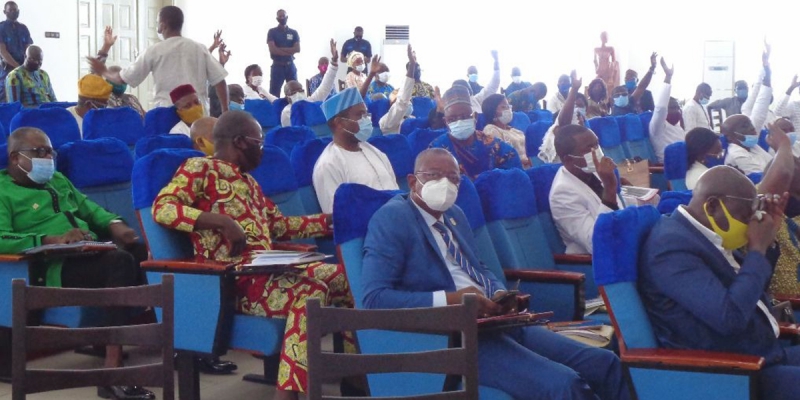Improving Water, Sanitation and Hygiene needs: Eight Benin municipalities selected to participate in USAID-funded MuniWASH project
It's official, eight municipalities in Benin are finalists for the USAID-funded West Africa Municipal Water, Sanitation, and Hygiene MuniWASH Activity. This announcement is a result of a selection process involving the Ministry of Decentralization and Local Governance, the Ministry of Water and Mines, the Benin National Water Company, and the Beninese Association for Social Marketing and Communication for Health, among others. The selected municipalities are Abomey-Calavi, Allada, Aplahoué, Avrankou, Bohicon, Cotonou, Ouidah, and Sô-Ava. Some are target areas of the Sanitation Services Delivery (SSD), an activity also funded by USAID for the years 2014-2021, and will complement MuniWASH activities.
The MuniWASH activity, is a five-year regional project funded by USAID and implemented by Tetra Tech, Inc. in Benin and Côte d'Ivoire. USAID's objective through this project is to assist municipal governments, national departments and agencies, and service providers to maintain and expand water, sanitation, and hygiene services to meet the basic needs of underserved populations and disadvantaged segments of the population living in urban and peri-urban areas.
In September 2020, the MuniWASH team met with each municipality’s council, which provided an opportunity to present the project to the different actors involved. These included mayors, city councillors, technical officials of the municipal administration, decentralized state services as well as private sector operators operating at the municipal level. In the community of Aplahoué, for example, the Société Nationale des Eaux (SONEB) took part in the meeting.
During exchanges, it emerged that the communities were very willing to commit themselves to MuniWASH. "This project is welcomed, we are ready to sign with MuniWASH," said Ahouandjinou Randyx, First Deputy Mayor of Cotonou, the economic capital of Benin. Access to drinking water services remains a challenge in Benin, although there has been a significant improvement over the last decade. According to the 2018 Demographic Health Survey (EDS5), the use of drinking water from an improved source in Benin increased from 67 percent in 2001 to 71 percent in 2017-2018. This growing increase in the rate of access to water in urban areas is now 62% according to SONEB's 2019 report. However, according to the Mayor of Avrankou, Mr. Ganhoutode Sèna Gabriel, additional efforts still need to be made: "the problem of drinking water is acute. Our peri-urban areas suffer greatly from the lack of access to drinking water. Our desire is to see MuniWASH carry out concrete actions that have a direct impact on the populations by allowing them to have better access to water and sanitation," he said.
For their part, the municipal council members of each of the eight municipalities met in deliberation sessions and gave their approval to authorize the Mayor to sign the Memorandum of Understanding between MuniWASH and the Municipality for the implementation of the program.
MuniWASH is focused on the reinforcement of operational, financial, and technical capacities of municipalities for better governance of the water and sanitation sector at the municipal level. “The capacity building component will help city hall executives to improve their performance,” continued Mr. Gabriel.
In addition, the project aims to improve the financial sustainability and private sector investment in WASH access and service providers and the operational reliability of public services and WASH service providers. As Mr. Gabriel explains, many participants welcomed the fact that “MuniWASH will work to mobilize resources for infrastructure financing to improve the conditions of poor and underserved households.” Ultimately, the successful experiences and lessons learned from the implementation of these activities will be shared and good practices disseminated at national and regional levels, primarily through channels hosted by the African Water Association. This will allow municipalities that were not selected for the program to benefit from the knowledge gained in MuniWASH’s implementation.

 English
English  Français
Français 
